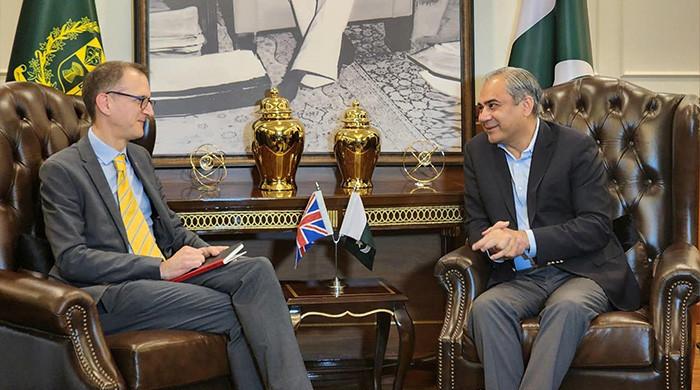- Pakistan and UK to finalize five memorandums of understanding on extradition.
- Both sides agree to strengthen cooperation in training.
- UK NCA chief executive condemns Islamabad suicide attack.
Interior Minister Mohsin Naqvi on Thursday held a meeting with the Director General of the UK’s National Crime Agency (NCA), Graeme Biggar, to discuss expanding bilateral cooperation in key areas of security and law enforcement.
The meeting, held in Islamabad, was also attended by British High Commissioner Jane Marriott, National Coordinator of National Counter Terrorism Authority (Nacta), Director Generals of National Cyber Crimes Investigation Agency (NCCIA), National Forensics Agency, Additional Secretary Interior, Chief Commissioner Islamabad and Inspector General of Police Islamabad.
The two sides held in-depth discussions on strengthening collaboration in counterterrorism, drug control, human trafficking prevention, forensic science, immigration and police training.
They agreed to enhance mutual cooperation in training programs for Pakistan’s anti-narcotics and law enforcement officers.
A joint decision was taken to improve coordination to combat online child exploitation. The two sides also agreed to expand their bilateral assistance in extradition matters.
It was decided that five memorandums of understanding (MoUs) covering extradition and other sectors of cooperation between Pakistan and the UK would be finalized soon.
Naqvi stressed that modern forensic support and advanced training could further strengthen the capabilities of the country’s law enforcement agencies. He noted that effective measures were being taken in collaboration with the United Kingdom to combat illegal immigration.
Biggar appreciated Pakistan’s efforts in the fight against narcotics and expressed NCA’s commitment to continue cooperation with the Pakistani government in multiple areas.
Biggar condemned the recent suicide attack in Islamabad and expressed sadness over the loss of lives.
Tuesday’s suicide blast targeted Islamabad’s district court complex, martyring 12 people and injuring at least 36 people. Among the victims were lawyers and petitioners who came to court.
The Islamabad blast took place on the same day that Pakistani forces cleared Cadet College Wana in South Waziristan’s Khyber Pakhtunkhwa tribal district, killing all Fitna al-Khawarij terrorists who had infiltrated the educational institution.
“The roots of terrorism are linked to our neighboring country,” Interior Minister Mohsin Naqvi said, reaffirming Pakistan’s unwavering resolve to eradicate terrorism.
“The world cannot ignore Pakistan’s resilience and determination in this fight,” he added.
Pakistan has been grappling with an increase in terrorist incidents, particularly in KP and Balochistan, since the Afghan Taliban regime took power in 2021.
Since then, terrorists have carried out hundreds of cross-border terror attacks in Pakistan, resulting in the martyrdom of soldiers and countless civilians, including women and children.
Pakistan has long urged the Afghan Taliban regime to prevent its soil from being used to launch attacks inside Pakistan.
Cross-border terrorism also led to tense border clashes between forces of the two neighboring countries in October.
The two countries have since stopped hostilities after a ceasefire agreement, requested by the Afghan Taliban regime.




